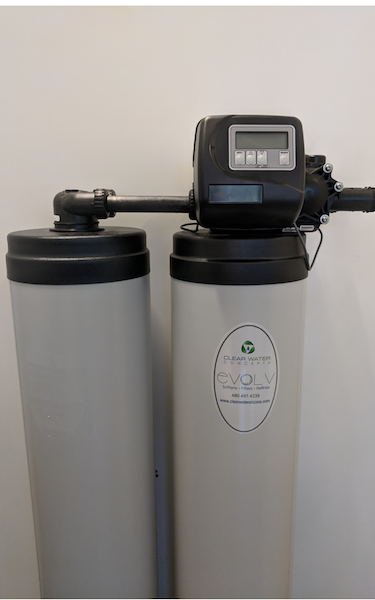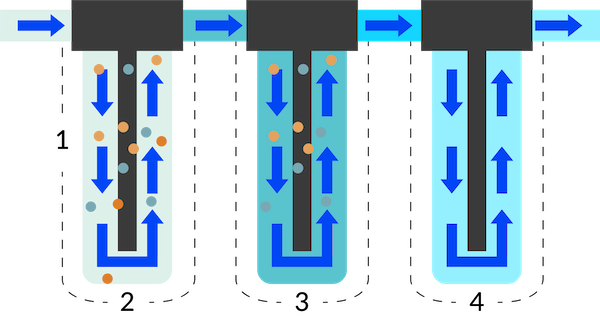
Water that comes to the tap also comes with contaminants. A study from the Environmental Working Group found carcinogenic chromium-6, which comes from waste products from agriculture and manufacturing industries, present in drinking water nearly 200 million Americans drink in all 50 states. American tap water can also contain impurities like mercury, lead and arsenic.
Even bottled water isn’t that much better. The EWG found 38 contaminants in 10 popular bottled water brands.
Besides the negative effects contaminated water has on taste, scent and health, minerals in water can clog up your pipes and drive up your water bill. Magnesium and calcium buildup in water creates hard water, which leaves behind a gross filmy residue on otherwise clean dishes, plus your hair and skin.
So what’s the best way to remove minerals and contaminants in water? The EWG recommends using a whole-house water filter for the safest water intake. But does a whole-house filtration system also fix hard water? Does a water softener purify water? Here are the differences you should consider when choosing a water processing system.
What’s Water Softening?
Water should clean things, not leave them grimy. Hard water is water that contains minerals like calcium or magnesium in it. When it’s used in the shower, it can leave your hair feeling filmy. It’s difficult to create a lather when washing your hands or hair. After washing dishes in the dishwasher, your glasses may look foggy from the minerals left behind. And hard water creates build-up in pipes that make water usage less efficient — using more water and causing water bills to skyrocket.
Water softening is the process of removing those minerals from hard water so that those problems also disappear. A water softener has polystyrene beads with sodium chloride ions. When the hard water passes over those beads, the mineral ions exchange with the sodium chloride ions. The amount of sodium is minuscule, so if you drink soft water or use it in cooking, it doesn’t have a salty taste.
Do I Need a Water Softener?
Hard water levels depend on the water sources the water is coming from. In the Phoenix area, the United States Geological Survey reports hard water levels are among the highest in the country. If you live in Arizona and don’t use a water softener, you’re likely to encounter the effects of hard water.
Water Softener Cost
The average cost of a water softener installation ranges between $800 to $3,000, depending on the type of water softener unit and the size of the home. Considering how much money you lose because of inefficient hard water delivery, a water softener is a cost-effective investment that protects your water quality.
What Is Whole-House Filtration?
Remember those yucky contaminants? A whole-house filtration system removes pollutants and contaminants from water. If you have a water softener but no filtration system, you’ll have removed the minerals from your water, but you still may be drinking, cooking and bathing in contaminants and chemicals like:
- Bacteria
- Heavy metals
- Chlorine by-products
A whole-house filtration system treats the water at its point of entry into a household. That means, no matter what tap, showerhead or other water source you’re using, the water has been treated.
Some water treatment systems only treat water at a sink or in a refrigerator for ice. But we use water in so many other ways than in the kitchen: to brush our teeth, to wash our hands and clothes, to shower with, to fill up a kiddie pool outside with, etc. All water that comes from your home can be treated with whole-house filtration.
How Whole-House Filtration Works

- Water entering your home enters a pre-filter, which removes larger impurities and contaminants from water, like sediment.
- The water is filtered for chlorine and volatile organic chemicals, which can also affect your home’s air quality after they evaporate.
- Water then goes through activated carbon, which removes contaminants like pesticides, copper and herbicides.
- The water then enters a polishing filtration phase, which removes any remaining sediment and organic particles.
Whole-House Filtration Cost
Whole-house water filtration systems remove contaminants that can affect your family’s health. You can get a whole-house filtration system for around anywhere from $1,000 to $2,300. Installation costs range from $200 to $900.
Combine Whole-House Filtration and Water Softening

For the best quality water, a combination of water softening and whole-house filtration is the ideal solution. The minerals from hard water can decrease the effectiveness of whole-house filtration and decrease the quality of the water — and your lifestyle and pipes.
Using a water softener with whole-house filtration produces the cleanest, purest water. Check out the Evolv Whole-House Water Filtration and Softener System to learn more.
If you want to protect your health and the taste, scent and integrity of your water, contact the Clear Water Concepts team. We’ll help you learn options for selecting a water softener and/or whole-house filtration system for your home.

